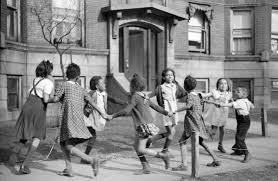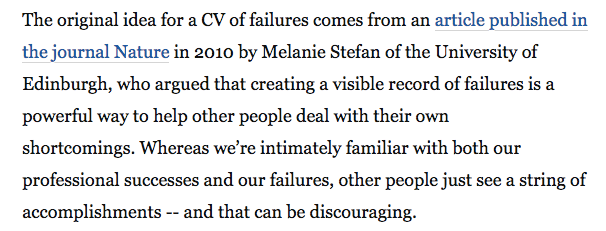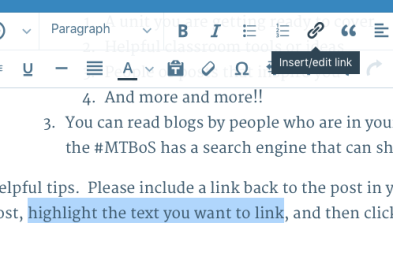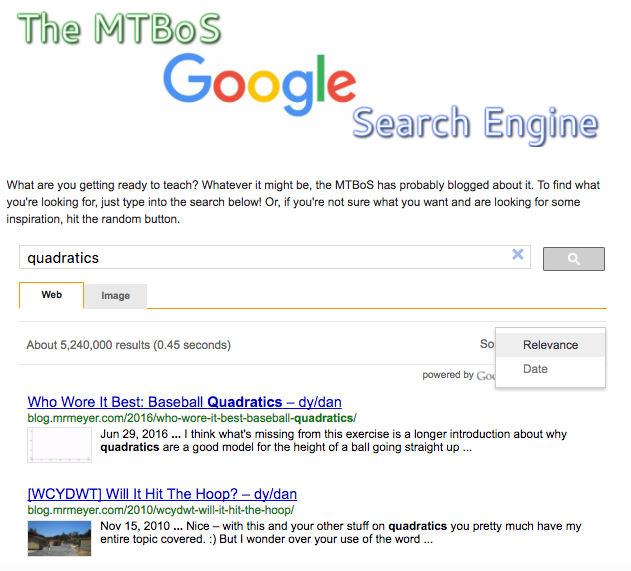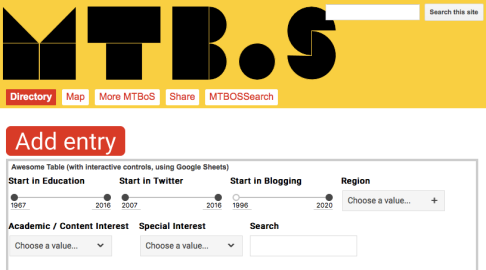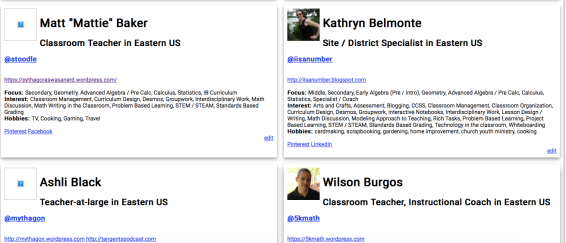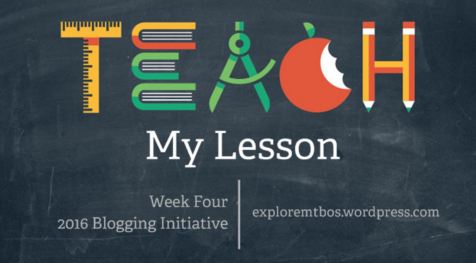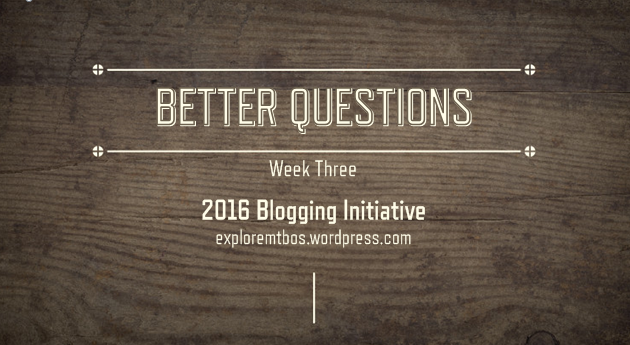Thanks to all who posted during week one of the 2017 Blogging Initiative! Below are the posts, sorted by grade level, with general posts at the bottom. Take time to read and comment if you would like! Be on the lookout later today for the prompt for week 2!
Grades 6 – 8
Cheryl Leung@ @MathEasyAsPi, has a blog named Math Easy As Pi.
The post for the Blogging Initiation is titled Minions In Math – My Favorite Thing” and the author sums it up as follows: Miniature robots zoomed across coordinate planes, putting on light displays at ordered pairs. This was the perfect way to review linear relationships and introduce systems of equations while simultaneously developing some coding experience.
Melynee Naegele @MNmMath, has a blog named mNm Math.
The post for the Blogging Initiation is titled One of My Favorites” and the author sums it up as follows: Tools I use to streamline instructional routines.
AnnaMarie Pacura @ampacura, has a blog named I Am A Math Teacher.
The post for the Blogging Initiation is titled MTBoS 2017 Blogging Initiative: My Favorites” and the author sums it up as follows: I shared my favorite middle school math resources that have used so far this year in my 6th, 7th, and 8th grade Algebra 1 classes, and one that I hope to use soon.
David Walker , has a blog named Common Core Geometry.
The post for the Blogging Initiation is titled The MTBoS Week 1: My Favorite Game” and the author sums it up as follows: Last year I was a sub, and I played this game to engage the students. Now I’m a full-time teacher, and this game works great when introducing new material.
Algebra 1 and 2
Julie Morgan @fractionfanatic, has a blog named fractionfanatic.
The post for the Blogging Initiation is titled My Favourites” and the author sums it up as follows: A new favourite foldable made this year. It’s purpose is to help my pupils understand how to sketch quadratics.
Nathaniel Highstein @nhighstein, has a blog named 17Goldenfish.
The post for the Blogging Initiation is titled MTBoS 2017: My favorite… tool for teaching transformations” and the author sums it up as follows: Using Desmos Marbleslides consistently across function families has made a huge difference in my students’ comfort and facility in transforming graphs from a parent function. Fun, depth of understanding, and perseverance!
SB Vaughn @vaughn_trapped, has a blog named vlogakavaughnlog.
The post for the Blogging Initiation is titled Completing The Square Completes Me” and the author sums it up as follows: I just love completing the square. It can make heroes!
Taylor Cesarski @tcesarski, has a blog named Exponential Growth.
The post for the Blogging Initiation is titled MTBoS My Favorite Thing” and the author sums it up as follows: As a student teacher, I’m excited to implement two-column practice this semester as a way for students to practice working with equations while also talking about mathematics! Collaboration on this activity allows students to be accountable for their mistakes and work together towards mastery.
Trever Reeh @treverreeh, has a blog named Math Techniques and Strategies.
The post for the Blogging Initiation is titled My Favorite Marshmallow Catapult” and the author sums it up as follows: Students always ask me what parabolas are good for and why you need to know the equation of one? This activity is hands-on and gives students insight on how mathematical modeling will help them in their future.
Jennifer Abel @abel_jennifer, has a blog named Mathsational.
The post for the Blogging Initiation is titled #MTBoSBlogsplosion Week 1: My Favorite Lesson So Far This Year – Candy Catapult Quadratics” and the author sums it up as follows: Algebra 2 students use a catapult to shoot candy, collect data, and write equations of parabolas. They even use parametric equations to make predictions (but don’t tell them that).
Geometry
Elena Histand Stuckey @elhistuck, has a blog named Finding the Good.
The post for the Blogging Initiation is titled My Favorites” and the author sums it up as follows: My post outlines why I finally started a blog and my new favorite idea for using plastic overhead transparencies without the overhead projector.
Pre-Calculus
Sam Shah @samjshah, has a blog named Continuous Everywhere but Differentiable Nowhere.
The post for the Blogging Initiation is titled 2, 4, 6, 8, What Do We Appreciate? A Card Sort!” and the author sums it up as follows: I don’t really think of doing card sorts in my class. They take time to create, and I always second guess their value. But I did what I thought was a really basic card sort in my standard precalculus class before we embarked on a unit on sequences, and it turned out to be just challenging enough to generate great conversations.
Fracqua has a blog named Matematiche.
The post for the Blogging Initiation is titled Blogging initiative” and the author sums it up as follows: Tricks to get students work in groups quickly, happily and effectively
Statistics
Gregory Taylor @mathtans, has a blog named Mathie x Pensive.
The post for the Blogging Initiation is titled My Fave: Media Math” and the author sums it up as follows: It’s about a media assignment that involves looking at bias within a student-chosen article about statistics. Includes reference to a webpage that allows analysis of sample sizes, by raosoft.
Jenni Clarkin @mrsclarkin, has a blog named Something to Smile About.
The post for the Blogging Initiation is titled My Favorite Class to Teach” and the author sums it up as follows: A little about me and why AP Stats is my favorite class to teach. Find out what makes it great and the awesome community of people who are part of it and want you to be too!
General
Suzanne Milkowich @smilkowich, has a blog named I Teach Math….
The post for the Blogging Initiation is titled My favorite thing is….whiteboards!” and the author sums it up as follows: I reference my three favorite things. Kahoot, the Grudge Game, and whiteboards.
Julie Reulbach @jreulbach, has a blog named I Speak Math.
The post for the Blogging Initiation is titled You MUST Try Desmos Activity Builder” and the author sums it up as follows: Desmos Activity Builder is the favorite thing that I use in my classroom. I created a Desmos Activity Builder that will expose teachers to many of the features Activity Builder has to offer. Go to my post to experience Activity Builder for yourself!
TAnnalet @TAnnalet, has a blog named Chasing Number Sense.
The post for the Blogging Initiation is titled My Favorite: From Sharing to Discussion” and the author sums it up as follows: I often notice that students are eager to share their ideas but are not paying attention to the ideas of others. I shared an example of a lesson where I noticed authentic mathematical discussion and noted how it was supporting my less confident students. I also have a few questions that I hope the MTBOS community can wonder about with me.
Jennifer Potier @jjfreo, has a blog named Mathematics Dreaming – From Rational to Real.
The post for the Blogging Initiation is titled Two of My Favourites – 2016 in Review” and the author sums it up as follows: The Mathematics classroom should be a safe, engaging and inspirational place to learn and love Mathematics. This post shares two of my most successful resources in 2016 – one very specific, and one very general. My belief is about learning to let go of a teacher centred learning environment and moving towards a challenging, motivating student-centred atmosphere that encourages exploration, questioning, challenge and collaboration. If your students aren’t challenged, OR if they do not learn to question, then they are NOT learning.
Geonz @geonz, has a blog named Resource ROom Blog.
The post for the Blogging Initiation is titled #MTBOS I think I’m here…” and the author sums it up as follows: It’s about my goal(s) for the year and trying to figure out how to move the blog to my website and have a blog launch page.
Micaela Newman @altmath, has a blog named Alternative Math.
The post for the Blogging Initiation is titled Student Grouping: My Favorite” and the author sums it up as follows: A simple way to adjust card sorts by using student groups to enhance discourse. Keeps the students engaged and working with many different voices.
Julia Finneyfrock @jfinneyfrock, has a blog named Designated Deriver .
The post for the Blogging Initiation is titled My Favorite: Seesaw!” and the author sums it up as follows: My favorite is about the app Seesaw! Seesaw is an interactive app for students and teachers to share videos, pictures and more!
Brianne Beebe @BusyMissBeebe, has a blog named Busy Miss Beebe.
The post for the Blogging Initiation is titled My New Favorite Routine” and the author sums it up as follows: I’m loving my new routine. It’s become my favorite thing.
Anna Blinstein @borschtwithanna, has a blog named Borscht With Anna.
The post for the Blogging Initiation is titled #MtbosBlogsplosion – My Favorites” and the author sums it up as follows: Using structured forms for peer feedback has been very helpful for my students this year. I’m sharing a form we have used for write-ups (developed by my awesome colleague Mandy) and one I just made for homework.
Greta @g_brgmn, has a blog named Count it All Joy.
The post for the Blogging Initiation is titled My Favorites: 2 Equation Activities” and the author sums it up as follows: SolveMe Mobiles is an app that is easy to use and great for getting students thinking algebraically. Balance Points is a movement activity/brain break that has student physically show the answer to an equation.
Algebra’s Friend @algebrasfriend, has a blog named Algebra’s Friend.
The post for the Blogging Initiation is titled Don’t judge a book by its cover – preview it!” and the author sums it up as follows: I recommend Stenhouse Publishers as a site for previewing professional reading.
Wwndtd @wwndtd, has a blog named What Would Neil deGrasse Tyson Do?.
The post for the Blogging Initiation is titled #MTBoSBlogspolsion: My Favorite” and the author sums it up as follows: So many dry erase fumes, so little time! (Maybe that’s why everyone loves whiteboards!)
Jamie Garner @mavenofmath, has a blog named Maven of Math.
The post for the Blogging Initiation is titled #mathconfession” and the author sums it up as follows: Mathematicians and teachers of mathematics are not perfect. Here is my #mathconfession. What’s yours?
Denise Gaskins @letsplaymath, has a blog named Let’s Play Math.
The post for the Blogging Initiation is titled My Favorite Math Games” and the author sums it up as follows: I’ve posted a lot of math games in 10+ years of blogging. Here, I’ve collected links to 26 games for preschool through adult players.
SergtPeppa @sergtpeppa, has a blog named Big Honkin’ WordPress.
The post for the Blogging Initiation is titled My Favorite: Group Roles” and the author sums it up as follows: Some thinking on groupwork roles and how we’ve thought through them and implemented them for emerging multilinguals.
Liz Mastalio @MissMastalio, has a blog named Mastalio. Math. Mavericks..
The post for the Blogging Initiation is titled My Favorite: Classroom Tool” and the author sums it up as follows: My favorite (and my student’s favorite) thing about my classroom is when we write on the tables with dry erase markers. It’s a motivational tool that makes my students more comfortable making mistakes!
Pamela Rawson @rawsonmath, has a blog named rawsonmath.
The post for the Blogging Initiation is titled My Favorite Games” and the author sums it up as follows: Advisory is about building relationships. Sometimes you have to put aside the work and just play a game together.
Janet Hollister @JanetHollister, has a blog named Pi R Square.
The post for the Blogging Initiation is titled My Favorite Math Practice” and the author sums it up as follows: This post is about how my understanding of the math practices has developed over time and how I have come to appreciate MP 7.
Anne Nedved @anedved, has a blog named Growing the Math Mind.
The post for the Blogging Initiation is titled New learning for the new year.. My favorite strategy” and the author sums it up as follows: Three strategies that have transformed my teaching
Adrienne Jones @aidigator, has a blog named Like a Good Teacher I Try New Things.
The post for the Blogging Initiation is titled My Favorites” and the author sums it up as follows: Making connections to my students and how that is as important as the math that happens. I let them know a bit about me which builds trust.
John O’Malley IV @jomalleyiv, has a blog named Functions Are Fun.
The post for the Blogging Initiation is titled Marker Magic – Practice @ The Board” and the author sums it up as follows: This post is about one of my favorite ways for students to practice skills.
Keegan Phillips @missmathematic, has a blog named inspiredmath.
The post for the Blogging Initiation is titled My favorite…” and the author sums it up as follows: When you’re passionate about 5 million different pursuits and things, how can you choose just one? This is exactly why I want to teach!

